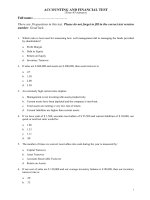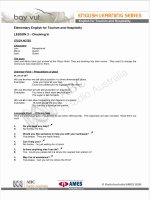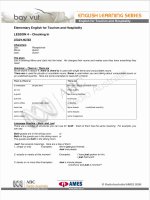NONFENITE AND FENITE CLAUCE
Bạn đang xem bản rút gọn của tài liệu. Xem và tải ngay bản đầy đủ của tài liệu tại đây (105.02 KB, 8 trang )
<span class='text_page_counter'>(1)</span><div class='page_container' data-page=1>
<b> CHAPTER I: </b>
NON- FINITE & VERBLESS CLAUSES
<b>I. NON-FINITE CLAUSES : </b>
<b>None – finite clauses are clauses whose verb element is a non-finite verb phrase, </b>
i.e. consists of non-finite elements such as an –ING participle (a), an –ED participle
(b), or an infinitive (c and d). Non- finite clauses can be constructed with or without
a subject.
(a) –ING participle clauses:
Without a subject: Feeling rather tired, I telephoned and said I couldn’t come.
With a subject: All the money having been spent, we started looking for work.
<i><b>(b) –ED participle clauses: </b></i>
Without a subject: Covered with confusion, she hurriedly left the room.
With a subject: The job finished, we went home straight away.
(c) TO- infinitive clauses:
Without a subject: The best thing would be to tell everybody.
With a subject: The best thing would be for you to tell everybody.
(The subject of an infinitive clause is often introduced by FOR.)
<i><b>(d) Bare infinitive: </b></i>
Without a subject: All I did was tell her the truth.
With a subject: Rather than John do it, I’d prefer to do the job myself.
<i><b>II- VERBLESS CLAUSES </b></i>
<b>Verbless clauses are clauses which contain no verb element, and often also no subject. </b>
They are regarded as clauses because they function in ways, which make them equivalent
to finite and non- finite clauses, and because they can be analyzed in ter
of one or more clause elements. We can usually assume that a form of the verb BE
been omitted:
Ex : Dozens of tourists were stranded, many of them children.
<i><b> (= many of tourists were children) </b></i>
A sleeping bag under each arm, Mr. Johnson tramped off on his vacation.
<i><b> (= There was a sleeping bag under each of his arms) </b></i>
<i><b>The subject, when omitted, can usually be understood as equivalent to the subject of </b></i>
<i><b>main clause: </b></i>
<i><b> The oranges, when ripe, are picked and sorted. (= when they are ripe) </b></i>
Whether right or wrong, Michael always comes off worst in an argument.
(= Whether he is right or wrong…)
<i><b>An adjective (or adjective phrase) can function as a verbless clause: </b></i>
By then nervous, the man opened the letter.
</div>
<span class='text_page_counter'>(2)</span><div class='page_container' data-page=2>
<i><b>An adverb may sometimes replace an adjective functioning as a verbless clause with </b></i>
<i><b>little difference in meaning: </b></i>
Nervously/ Nervous, the man opened the letter.
<b>III- OMISSION IN NON – FINITE AND VERBLESS CLAUSES </b>
Non- finite and verbless clauses are mostly used in formal or written styles of
English because they are more economical and avoid repetition in comparison with
finite subclauses.
<i><b>*TO- infinitive clauses: I hope to be present. (= I hope that I shall be present.) </b></i>
*-ING clauses: Living in the country, we had few social visits.
( = Since we lived in the country …)
<i><b>*-ED clauses: The man injured by the bullet was taken to the hospital. </b></i>
(= The man who was injured by the bullet …)
Though defeated, he remained a popular leader.
(with subordinator ‘though’)
(= Though he had been defeated …)
<i><b> • Verbless clauses: </b></i>
A man of few words, Uncle George declined to express an opinion.
(= As he was a man of few words …)
<b>EXERCISES </b>
<b>NON- FINITE AND VERBLESS CLAUSES </b>
<b>I/ Underline and classify the function of the non- finite and verbless clauses in the </b>
<b>following sentences: </b>
1. My favourite thing to do is collecting actors’ photographs.
...
2. You must learn to work hard and to deal with difficulties.
...
3. She sang when allowed to do so.
...
4. The long journey over, we relaxed in the warm sunshine.
...
5. He was a delightful companion, always cheerful and considerate.
...
6. Having been invited to speak, and then being told to keep silent, I shall never
come here again as long as I live.
...
7. Since I have been especially invited to speak, for you now to tell me I can not do
so is quite unpardonable.
...
8. Standing here all day, I see many strange faces.
</div>
<span class='text_page_counter'>(3)</span><div class='page_container' data-page=3>
...
10. My greatest pleasure is to listen to chamber music.
...
11. To listen to chamber music is my greatest pleasure.
...
12. To speak in public for the first time can be a terrifying experience.
...
13. His greatest pleasure, climbing mountains, had to be abandoned.
...
14. While in the army, he learnt a great deal about electricity.
...
15. I expect everyone to be punctual this evening.
...
16. Not feeling very well, I decided to stay at home.
...
17. They pump waste into the water, killing all the fish.
...
18. Taken daily, vitamin pills can improve your health.
...
19. To turn down the invitation seems rude.
...
20. The important thing is not to panic.
...
21. Not very happy with the result, he said nothing to his girlfriend.
...
22. His ambition, to be a straight actor, was never fulfilled.
...
23. Whether busy or not, you have to come to our party next Sunday.
...
24. Although a very pretty girl, she agreed to marry an ugly man.
...
25. Walking quickly is difficult for her now.
...
26. The child crying over there always helps me with my housework.
...
27. The concert given by the Philharmonic Orchestra was a great success.
...
28. I will never let you use my bicycle again.
...
29. In the next berth, she could hear her stepmother breathing heavily.
...
30. This duty completed, he had three months’ leave.
...
<b>II/ The non- finite clauses in the sentences below are open to more than one </b>
</div>
<span class='text_page_counter'>(4)</span><div class='page_container' data-page=4>
<b>ways: </b>
1. I ran over a dog crossing the square.
...
2. To see her alone would be very indiscreet.
...
3. Though shouting as loudly as possible, the rescuers could not hear us.
...
4. Dressed in white robes, we thought the visitors looked like priests in some
strange ceremony.
...
5. I regret speaking to you so bluntly.
...
6. Walking fast after breakfast could be fatal.
...
7. He was so ill as to be obliged to give up work altogether.
...
8. It will take several hours to finish this.
...
9. Whether here or not, his application will have to be considered.
...
10. Always afraid of snakes, we shut every door and window at night.
...
CHAPTER II:
<b> ANALYSIS OF SENTENCES </b>
To analyse a sentence is to break it up into its component parts and to show the
mutual relations of those parts. Each clause contains one finite verb, so if we know the
number of finite verbs we know the number of clauses in a complex sentence or a
passage.
There are three kinds of sentences:
<b>+ Simple sentences: -The baby cried loudly. </b>
-I wrote a letter to my cousin.
<b>+ Compound sentences: The baby cried and shouted his mother’s name. </b>
I wrote a letter to my cousin, but he didn’t reply it.
<b>+ Complex sentences: Although the baby cried loudly, nobody heard him. </b>
I wrote a letter to my cousin so that I could tell him about my
conclusion.
<b>I- ANALYSIS OF SIMPLE SENTENCES </b>
• A simple sentence is one that has only one finite verb. Every sentence can
ivided in two main parts: the subject and the predicate.
</div>
<span class='text_page_counter'>(5)</span><div class='page_container' data-page=5>
<b>- PREDICATE: the part of the sentence which makes a statement abo</b>
the subject. The chief part of the predicate is a finite verb including
complementation or not.
<b>Ex: These roses smell sweet. </b>
W a l k i n g can help improve your health.
• Seven sentence patterns of the simple sentence:
<b>1. S – V We / were dancing. </b>
<b>2. S – V – C We / were / tired. </b>
<b>3. S – V – A We / were dancing / at Queen discotheque. </b>
<b>4. S – V – O Who / knows / the answer ? </b>
<b>5. S – V – O – C The director / made / us / disappointed. </b>
<b>6. S – V – O – A Please put / this box / under the cupboard. </b>
<b>7. S – V – O – O My sister / showed / me / her boyfriend’s photo. </b>
<b>II- ANALYSIS OF COMPOUND SENTENCES </b>
A compound sentence is made up of two (or more) co-ordinate clauses joining
conjunction(s). These clauses are of equal importance.
<b>Ex: Bring your book here and open it at page 4; but don’t begin reading. </b>
<b>In compound sentences the subject or the auxiliary verb, or both, may be omitted</b>
<b>the second sentence if they are the same as those in the first sentence. </b>
<b>Ex: You must come tomorrow and (you must) bring your book with you. </b>
- Number of clauses: 2 * you must come tomorrow
(Both are main clauses) * (you must) bring your book with you
- Connecting word: but
<b>III- ANALYSIS OF COMPLEX SENTENCES </b>
- A complex sentence normally has one independent clause (principle clause) and
one or more dependent clauses (subordinate clauses).
E.g.: Although she was tired, she walked up to the third floor because she wanted the
exercise.
1 2 3
<b> 1,3: dependent clauses </b>
2: independent clause.
- To analyse a complex sentence is:
1) To find out the number of clauses.
2) To identity the principal clause and all the subordinate clause(s), then indicate
their functions in the sentence.
</div>
<span class='text_page_counter'>(6)</span><div class='page_container' data-page=6>
<b>E.g: </b>
<b>1- The boy, who was crying as if his heart would break, when I spoke to him, said </b>
that he was hungry because he had had nothing to eat for two days.
Clause Kind of clause Function Connecting words
The boy said Principle Makes a statement
who was crying Adjective Qualifies ‘boy’ who
as if his heart
would break Adverb
Modifies ‘was
crying as if
when I spoke to
him Adverb Modifies ‘said’ when
that he was hungry Noun Object of ‘said’ that
to eat Non finitive
To-infinitive
Postmodifies
‘nothing’
Branch diagram: Principle clause
Principle clause
Noun cl Adverb cl. Adjective cl.
A d v . c l A d v . c l a u s e
…
2- She knew, as she conversed in superstitious whispers with Mrs. Rose, who has
taught her all she knew that she had made the mistake of her life in coming to this
nightmare of a country with her unborn child.
<b>EXERCISES </b>
Analyse the following sentences:
1. An observant person who sees the carcass of a small animal lying on the ground
will probably find, if he returns to the spot the next day, that the object has
disappeared.
...
...
2. Anxious to finish all the typing that had accumulated, the secretary told the
manager, when he was going to leave the office, that she decided to work
overtime until she completed the work without having lunch and he, a very kind
man, agreed and asked if she had anything to eat.
</div>
<span class='text_page_counter'>(7)</span><div class='page_container' data-page=7>
...
...
4. When she used the leather trap, she displayed a strength that even the biggest,
most loutish boy dreaded for not only did she fail his hands until they swelled to
Lê Thị Thiệp Khoa Ngoại Ngữ
<b>English Grammar 4 - 12 – </b>
red, aching paws, but she tongue-lashed him with a virtuosity that threw her
classes into an ecstasy of silent delight.
...
...
5. Richard, though he had not previously answered any questions when the teacher
asked him, now said that he knew the answer to this one because it was in the
lesson that he had just read.
...
...
6. When the teacher asked what part of speech a word was, John said, “I can tell
you the answer, if you will give me a sentence in which the word is used.”
………
………
……
7. James controlled himself, for he did not want to betray his surprise, and his
whole future depended on success at this interview.
………
………
……
8. As dawn approached, the sky grew red, the crowds became quieter, the cold was
making itself felt somewhat less acutely, and an atmosphere of steady calm
replaced the extremes of indifference on one hand and uncontrolled abandon on
the other.
………
………
……
9. I explained to everyone when being asked for help that I was not a healer and
that I did not know if my roots might help but that if they wished me to try to heal
Bob I would do so.
………
………
……
10. The general idea is that a home is at the right temperature if, while indoors, you
can wear clothes which are the exact opposite of those appropriate for the
</div>
<span class='text_page_counter'>(8)</span><div class='page_container' data-page=8>
………
………
</div>
<!--links-->









